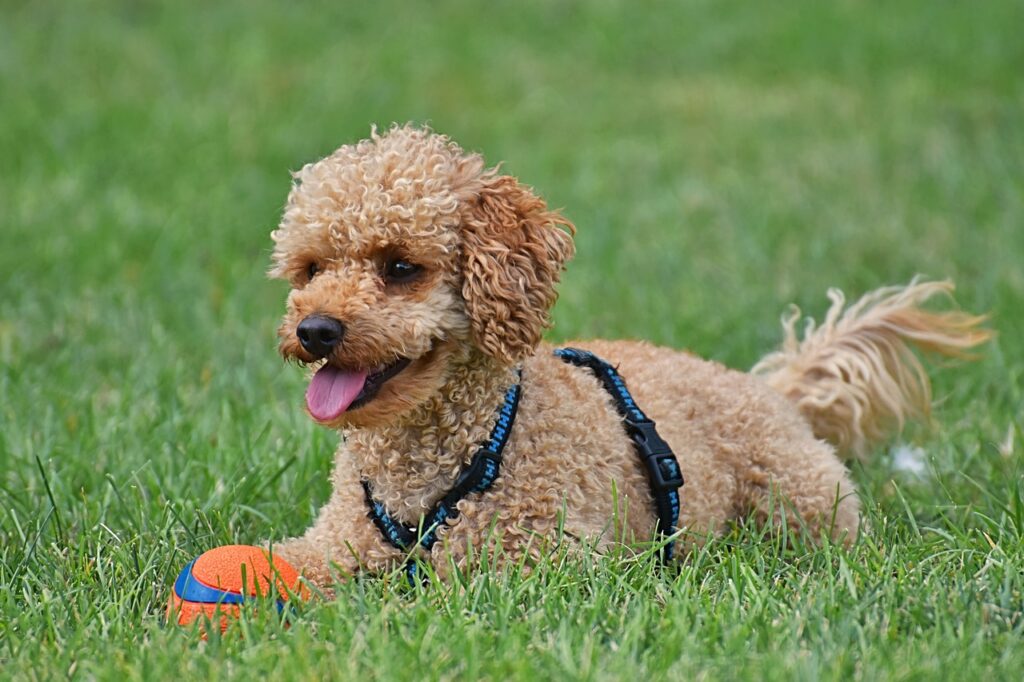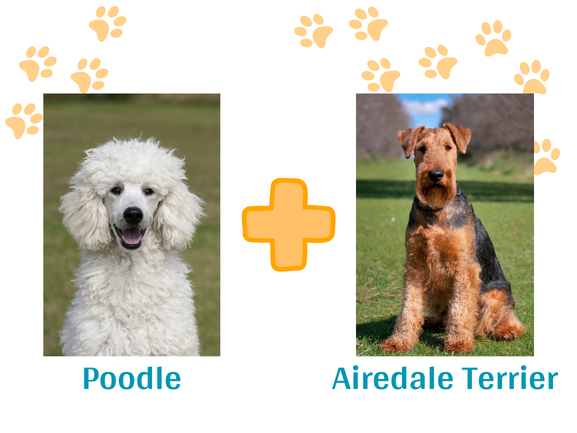The Ultimate Guide to Poodles: Everything You Need to Know
Poodles are one of the most recognizable and beloved dog breeds in the world. Known for their distinctive curly coats, intelligence, and elegant demeanor, They are a versatile breed that excels in various roles, from show dogs to family pets.

Colors
Various, including white, black, apricot, and gray
Personality
Intelligent, energetic, affectionate; good with children and other animals
Best Suited for
Active individuals or families who provide regular exercise and grooming; homes with children or other pets
Origins of the Poodle
Poodles have a rich history that dates back to ancient times. Originally bred in Germany as water retrievers, Poodles were prized for their ability to retrieve game from water. The breed’s name is derived from the German word “pudel” or “pudelin,” meaning “to splash in water.” Over time, Poodles gained popularity in France, where they became known as the national dog and were refined into the breed we recognize today.

Appearance
Poodles are renowned for their distinctive curly or corded coats, which are hypoallergenic and low-shedding. Their coats come in a variety of colors, including white, black, apricot, silver, blue, and more. Poodles have a proud, elegant posture, with a well-proportioned body, long neck, and alert expression.
Temperament
Poodles are known for their exceptional temperament, which includes:
| SOCIABLE They are generally friendly with children and other pets, making them excellent family dogs. | INTELLIGENT Poodles are one of the smartest dog breeds, excelling in obedience training and learning new tricks quickly. |
| AFFECTIONATE They form strong bonds with their families and are known for their loyalty and loving nature. | ACTIVE Poodles have high energy levels and enjoy physical activities such as running, swimming, and playing fetch. |
| ADAPTABLE They can adjust well to different living environments, from apartments to larger homes, as long as they receive enough attention and exercise. | PLAYFUL Poodles retain a playful nature throughout their lives, making them fun companions for games and activities. |
Types of Poodles
Poodles come in three distinct sizes: Standard, Miniature, and Toy. Each size has its unique characteristics and appeal.
Characteristics: Toy Poodles are affectionate and charming, well-suited for apartment living and individuals seeking a small, intelligent companion.
Standard Poodle
Height: Over 15 inches
Weight: 40 to 70 pounds
Characteristics: Known for their athleticism and versatility, Standard Poodles are excellent companions and excel in various canine sports.
Miniature Poodle
Height: 10 to 15 inches
Weight: 10 to 15 pounds
Characteristics: Miniature Poodles are lively and intelligent, making them great family pets and therapy dogs.
Toy Poodle
Height: Under 10 inches
Weight: 4 to 6 pounds
Training and Exercise Needs
Due to their high intelligence, Poodles are highly trainable and thrive on mental stimulation. Early socialization and positive reinforcement training methods are crucial for raising a well-behaved Poodle. They excel in various canine activities, including obedience, agility, and water sports.
Poodles require regular exercise to keep them physically and mentally healthy. Daily walks, playtime, and interactive games are essential to prevent boredom and promote overall well-being. Standard Poodles, in particular, benefit from more intensive physical activities due to their larger size and higher energy levels.
Grooming
Poodles’ curly coats require regular grooming to maintain their appearance and prevent matting. Grooming needs include:
Nail Trimming: Regular nail trimming to prevent overgrowth and discomfort.
Brushing: Regular brushing, ideally daily, to prevent tangles and matting.
Haircuts: Professional grooming every 4 to 6 weeks to maintain coat length and style. Popular styles include the Continental clip and the Sporting clip.
Bathing: Regular baths to keep their coats clean and healthy.
Ear Cleaning: Routine ear cleaning to prevent infections, as Poodles are prone to ear issues.
Dental Care: Regular teeth brushing to maintain oral health.
Health
Poodles are generally healthy dogs, but like all breeds, they are prone to specific health issues. Common concerns include:
1. Dental Issues: Dental problems like tartar buildup and gum disease can occur. Regular teeth brushing and dental check-ups are important.
2. Ear Infections: Due to their floppy ears, Poodles are prone to ear infections. Regular ear cleaning and maintenance can help prevent this.
3. Skin Issues: Poodles can develop allergies that cause skin irritations. Identifying and avoiding allergens can help manage symptoms.
4. Tear Stains: Poodles may experience tear staining, which can be managed with regular cleaning and sometimes dietary adjustments.
1. Hip Dysplasia: A genetic condition where the hip joint doesn’t fit into the hip socket properly, leading to arthritis and pain. Regular veterinary check-ups and weight management can help manage this condition.
2. Progressive Retinal Atrophy (PRA): A genetic disorder that leads to degeneration of the retina and can cause vision loss or blindness. Regular eye exams can help monitor and manage this condition.
3. Addison’s Disease: A condition where the adrenal glands don’t produce enough hormones, leading to symptoms like lethargy, vomiting, and weight loss. Lifelong medication is often required.
4. Cushing’s Disease: Caused by an overproduction of cortisol, leading to symptoms such as excessive thirst, urination, and weight gain. Treatment usually involves medication and regular monitoring.
5. Epilepsy: A neurological condition that can cause seizures. Management typically involves medication and regular veterinary care to control seizures.
Regular veterinary check-ups, a balanced diet, and maintaining a healthy weight can help manage these health concerns and ensure a long, healthy life for your Poodle.
Socialization and Interaction
Poodles are highly social and intelligent dogs that thrive on interaction with their families and other pets. Proper socialization from a young age is crucial to ensure they develop into well-rounded, confident adults. Regular exposure to different environments, people, and animals helps Poodles become friendly and adaptable companions.
Poodle Lifespans by Size
Poodles come in three distinct sizes—Standard, Miniature, and Toy—each with its own average lifespan. Understanding these variations can help in providing the best care for your Poodle and setting realistic expectations for their health and longevity.
Standard Poodles
- Lifespan: 10-13 years
- Details: As the largest of the Poodle varieties, Standard Poodles often face higher risks for certain health issues, which can impact their lifespan. Regular veterinary care and a healthy lifestyle can help maximize their longevity.
Miniature Poodles
- Lifespan: 12-15 years
- Details: Miniature Poodles generally enjoy a longer lifespan compared to Standards. Their smaller size contributes to fewer health complications, but they still require regular exercise and preventive care to stay healthy.
Toy Poodles
- Lifespan: 14-18 years
- Details: Toy Poodles typically have the longest lifespan of the Poodle varieties. Their small size is associated with fewer health problems, leading to a longer, healthier life. Regular check-ups and a balanced diet are important for maintaining their well-being.
Finding an Airedoodle
When considering a Poodle, it’s essential to choose a reputable source. Adoption from a rescue organization or shelter provides a loving home to a dog in need. Alternatively, if you prefer a specific lineage or puppy, seek out reputable breeders who prioritize health, temperament, and ethical breeding practices.
Conclusion
Poodles are a remarkable breed that combines elegance, intelligence, and versatility. Whether you are looking for a lively companion, a competitive sports dog, or a loving family pet, Poodles can excel in various roles. By understanding their needs and providing proper care, training, and attention, you can enjoy a fulfilling and joyful relationship with your Poodle.
| Trait | Description |
|---|---|
| Size | Standard: 18-24 inches; Miniature: 10-15 inches; Toy: up to 10 inches |
| Weight | Standard: 45-70 pounds; Miniature: 12-20 pounds; Toy: 4-6 pounds |
| Lifespan | Standard: 10-13 years; Miniature: 12-15 years; Toy: 14-18 years |
| Coat | Curly and dense, low-shedding |
| Colors | Various, including white, black, apricot, and gray |
| Personality | Intelligent, energetic, affectionate; good with children and other animals |
| Exercise Needs | High; requires daily exercise and mental stimulation |
| Grooming Needs | High; requires regular grooming and trimming |
| Training | Highly trainable; responds well to positive reinforcement |
| Socialization | Thrives on interaction; benefits from early and consistent socialization to be well-rounded and confident |
| Health Concerns | Prone to hip dysplasia, progressive retinal atrophy, and other genetic conditions; regular vet check-ups and preventive care are essential |
| Adoption Options | Available through rescue organizations and shelters for those seeking to provide a home to a dog in need |
| Breeder Options | Seek out reputable breeders who prioritize health, temperament, and ethical breeding practices; verify credentials and visit breeding facilities if possible |
| Best Suited For | Active individuals or families who can provide regular exercise and mental stimulation; those willing to commit to regular grooming; homes with children or other pets due to their friendly and adaptable nature |
